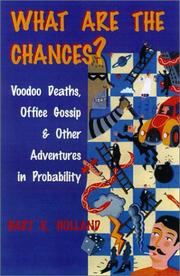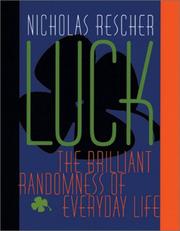| Listing 1 - 10 of 131 | << page >> |
Sort by
|
Book
Year: 2023 Publisher: London : UCL Press,
Abstract | Keywords | Export | Availability | Bookmark
 Loading...
Loading...Choose an application
- Reference Manager
- EndNote
- RefWorks (Direct export to RefWorks)
Beliefs, superstitions and tales about luck are present across all human cultures, according to anthropologists. We are perennially fascinated by luck and by its association with happiness and danger, uncertainty and aspiration. Yet it remains an elusive, ungraspable idea, one that slips and slides over time: all cultures reimagine what luck is and how to tame it at different stages in their history, and the modernity of the 'long twentieth century' is no exception to the rule. Apparently overshadowed by more conceptually tight, scientific and characteristically modern notions such as chance, contingency, probability or randomness, luck nevertheless persists in all its messiness and vitality, used in our everyday language and the subject of studies by everyone from philosophers to psychologists, economists to self-help gurus. Modern Luck sets out to explore the enigma of luck's presence in modernity, examining the hybrid forms it has taken on in the modern imagination, and in particular in the field of modern stories. Indeed, it argues that modern luck is constituted through narrative, through modern luck stories. Analysing a rich and unusually eclectic range of narrative taken from literature, film, music, television and theatre - from Dostoevsky to Philip K. Dick, from Pinocchio to Cimino, from Curtiz to Kieślowski - it lays out first the usages and meanings of the language of luck, and then the key figures, patterns and motifs that govern the stories told about it, from the late nineteenth century to the present day.
Book
ISBN: 9004429557 Year: 2020 Publisher: Leiden, The Netherlands ; Boston : Brill,
Abstract | Keywords | Export | Availability | Bookmark
 Loading...
Loading...Choose an application
- Reference Manager
- EndNote
- RefWorks (Direct export to RefWorks)
In Physiognomy in Ming China: Fortune and the Body , Xing Wang investigates the intellectual and technical contexts in which the knowledge of physiognomy ( xiangshu ) was produced and transformed in Ming China (1368-1644 C.E.). Known as a fortune-telling technique via examining the human body and material objects, Xing Wang shows how the construction of the physiognomic body in many Ming texts represent a unique, unprecedented ‘somatic cosmology’. Applying an anthropological reading to these texts and providing detailed analysis of this technique, the author proves that this physiognomic cosmology in Ming China emerged as a part of a new body discourse which differs from the modern scholarly discourse on the body.

ISBN: 0801875927 9780801875922 9780801869419 0801869412 Year: 2002 Publisher: Baltimore Johns Hopkins University Press
Abstract | Keywords | Export | Availability | Bookmark
 Loading...
Loading...Choose an application
- Reference Manager
- EndNote
- RefWorks (Direct export to RefWorks)
Whether you have only a distant recollection of high school algebra or use differential equations every day, this book offers examples of the impact of chance that will amuse and astonish.
Probabilities --- Chance --- Fortune --- Necessity (Philosophy)
Book
ISBN: 0190453915 0190267534 1283427729 9786613427724 0199876673 9780199876679 0199742987 9780199742981 9781283427722 9780190267537 9780199742981 9780190453916 6613427721 Year: 2012 Publisher: Oxford Oxford University Press
Abstract | Keywords | Export | Availability | Bookmark
 Loading...
Loading...Choose an application
- Reference Manager
- EndNote
- RefWorks (Direct export to RefWorks)
In this collection of essays -- a follow up to My Way and Our Stories -- John Martin Fischer defends the contention that moral responsibility is associated with ""deep control"". Fischer defines deep control as the middle ground between two untenable extreme positions: ""superficial control"" and ""total control"". Our freedom consists of the power to add to the given past, holding fixed the laws of nature, and therefore, Fischer contends, we must be able to interpret our actions as extensions of a line that represents the actual past. In ""connecting the dots"", we engage in a distinctive sor

ISBN: 0822957558 1322096414 0822972271 9780822972273 9780822957553 Year: 1995 Publisher: Pittsburgh, Pennsylvania : University of Pittsburgh Press,
Abstract | Keywords | Export | Availability | Bookmark
 Loading...
Loading...Choose an application
- Reference Manager
- EndNote
- RefWorks (Direct export to RefWorks)
Annotation
Chance. --- Fortune. --- Fate and fatalism. --- Destiny --- Fatalism --- Fortune --- Philosophy --- Necessity (Philosophy) --- Luck --- Opportunity --- Probabilities
Book
ISBN: 1438449739 9781438449739 9781438449715 1438449712 Year: 2014 Publisher: Albany
Abstract | Keywords | Export | Availability | Bookmark
 Loading...
Loading...Choose an application
- Reference Manager
- EndNote
- RefWorks (Direct export to RefWorks)
"An analysis of contemporary technological society through the lens of Greek tragedy"--Provided by publisher.
Fate and fatalism --- Destiny --- Fatalism --- Fortune --- Philosophy --- Necessity (Philosophy) --- History.
Book
ISBN: 1628942304 9781628942309 9781628942286 9781628942293 Year: 2016 Publisher: New York
Abstract | Keywords | Export | Availability | Bookmark
 Loading...
Loading...Choose an application
- Reference Manager
- EndNote
- RefWorks (Direct export to RefWorks)
Fate and fatalism. --- Destiny --- Fatalism --- Fortune --- Philosophy --- Necessity (Philosophy)
Book
ISBN: 9781573668682 1573668680 9781573660570 1573660574 Year: 2016 Publisher: Tuscaloosa, Alabama : FC2,
Abstract | Keywords | Export | Availability | Bookmark
 Loading...
Loading...Choose an application
- Reference Manager
- EndNote
- RefWorks (Direct export to RefWorks)
"In the novel, Year of the Rat by Marc Anthony Richardson, an artist returns to the city of his birth to tend to his invalid mother, only to find himself torn apart by memories and longings. Narrated by this nameless figure whose rants, reveries, and Rabelaisian escapades take him on a Dantesque descent into himself, the story follows him and his mother as they share a one-bedroom apartment over the course of a year"-- "Winner of FC2's Ronald Sukenick Innovative Fiction Prize In The Year of the Rat, an artist returns to the dystopian city of his birth to tend to his invalid mother, only to find himself torn apart by memories and longings. Narrated by this nameless figure whose rants, reveries, and Rabelaisian escapades take him on a Dantesque descent into himself, the story follows him and his mother as they share a one-bedroom apartment over the course of a year. Despite his mother's precarious health, the lingering memories of a lost love, an incarcerated sibling, a repressed sexuality, and an anarchic inability to support himself, he pursues his dream of becoming an avant-garde artist. His prospects grow dim until a devastating death provides a painful and unforeseeable opportunity. With a voice that is poetic and profane, ethereal and irreverent, cyclical and succinct, he roams from vignette to vignette, creating a polyphonic patchwork quilt of a family portrait"--
FICTION / Literary. --- Opportunity --- Self-perception --- Mothers and sons --- Artists --- Fortune
Book
ISBN: 9004422374 Year: 2020 Publisher: Leiden, Netherlands : Brill,
Abstract | Keywords | Export | Availability | Bookmark
 Loading...
Loading...Choose an application
- Reference Manager
- EndNote
- RefWorks (Direct export to RefWorks)
"In Chinese Character Manipulation in Literature and Divination, Anne Schmiedl analyses the little-studied method of Chinese character manipulation as found in imperial sources. Focusing on one of the most famous and important works on this subject, the Zichu by Zhou Lianggong (1612-1672), Schmiedl traces and discusses the historical development and linguistic properties of this method. This book represents the first thorough study of the Zichu and the reader is invited to explore how, on the one hand, the educated elite leveraged character manipulation as a literary play form. On the other hand, as detailed exhaustively by Schmiedl, practitioners of divination also used and altered the visual, phonetic, and semantic structure of Chinese characters to gain insights into events and objects in the material world".
Zichu. --- Fortune-telling by Chinese characters. --- Zhou, Lianggong,
Film

ISBN: 9059393554 9789059393554 Year: 2007 Publisher: Haarlem Moskwood Media
Abstract | Keywords | Export | Availability | Bookmark
 Loading...
Loading...Choose an application
- Reference Manager
- EndNote
- RefWorks (Direct export to RefWorks)
A fortune-teller declares that a boy must be walled up alive in a fort to keep it from crumbling in medieval Caucasus; from the folk legend.
Folklore --- Čonkʻaże, Daniel, --- Self-sacrifice --- Fortune-tellers --- Filmregisseurs, acteurs, filmografen
| Listing 1 - 10 of 131 | << page >> |
Sort by
|

 Search
Search Feedback
Feedback About UniCat
About UniCat  Help
Help News
News